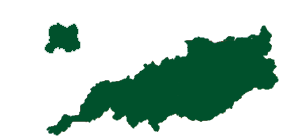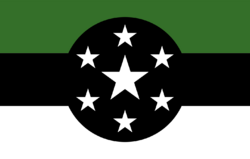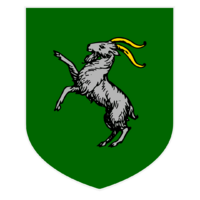Swinas
Federal Republic of Swinas Repubblica Federale di Swinas | |
|---|---|
 | |
| Capital | Cape Cresta City |
| National Language | Italian, Common |
| Ethnic groups |
|
| Demonym(s) | Swish |
| Government | Federal Republic |
• First Consul | Eduard Hoffman |
• Second Consul | Perlita Mele |
| Area | |
• Total | 985,095 km2 (380,347 sq mi) |
| Population | |
• 2021 census | 42,299,153 |
| GDP (nominal) | estimate |
• Total | 448,984,350,000 |
| Currency | Swish Ram, Swish Buckling (SR, SB) |
| Driving side | right |
| Calling code | +59 |
The Federal Republic of Swinas is an Italian speaking nation on the continent of Hiraethia has an island in the Talsar Sea. The nation can trace it's beginnings all the way back to around 150 BCE, but has officially been existing since 1564. The Federal Republic of Swinas shares a border with Vultesia and Wellsenfaile. The country has a dual-consular government, where two consuls are elected by the Swish People and share the powers that the head of the executive branch would normally hold. The Federal Republic of Swinas' government also contains a Senate, which passes legislation which can be vetoed and must be signed by both consuls. Besides on a federal level, the Federal Republic also contains the provinces of Cresta, Tharbarn, Granton, Consilana, Valdona, and Nordinsel. Each of these 6 provinces are represented by the 6 stars on the Swish Flag, with the star in the center representing the Federal Swish Governent.
History
Rise of the Swish People
The origin of the Swish people is a defined history, where the culture was unique, rather than simply a blend of other cultures, though some aspects of Swish Culture did consist of aspects of other cultures. The earliest recording of a "unified" Swish Government would be in the Western Deserts of Hiraethia, where many Swish People would construct their houses with sandstone. The origins of the idea for the development of housing this way is unknown, but it is generally considered that in this early Swish Civilization, the family with the bigger house was most likely the family which originated from the developer or bringer of sandstone to the Swish Desert. During this time period, it is believed that many Swish People spoke a rather simplistic language, and had a logographic writing system. In addition, many Swish People enjoyed community throat singing, and supposedly had their singing 'in tune with the sand'. The first advanced civilization that arose within this time period was "Cristatea", which was located in the eastern Swish Desert. Due to their close connection the more fertile lands of Eastern Swinas, they were able to develop a greater farming system, and would generally have a monopoly on foodstuff in Swinas. In addition, their fighting system was unique in that they utilized an early slingshot, where you would load in a rock, which would then proceed to hit wherever you aimed it. These now primitive weapons were far superior to anything else any other civilization had, and they easily dominated the Swish Desert. Their downfall, however, was the development of new religions, as well as the continued existence of other rival religions. In addition to this, the Empire also suffered communications issues, and the empire was ultimately divided.
The fame of Cristatea, however, would remain for quite some time, with the inventive spirit of the empire continuing to exist throughout Swinas. In addition, Cristatea also inspired many migrations to the more fertile lands of Eastern Swinas, near where modern-day Tharbarn is. During this time, mining would begin to become popular, and Swinas would experience the bronze age, around 3000 BC. Though the might of Cristatea was powerful, their power was only in conquest, not in leadership by any means. The divide of the empire lead to the centralization of Swish communities, and allowed for innovation to be conducted much easily. During this time, warfare was mainly for resources, with many different Swish Tribes wishing to gain a monopoly on Bronze Mines. During this time period, one civilization, though certainly not great yet, would still undergo great fortune in dominating the bronze mines of the Eastern Swish plains, and would slowly gain a monopoly in Eastern Swinas. In addition, the excellent leadership lead to the rise of the great Capcressia, which would hold onto power for much longer than Cristatea ever could. This is the rise of Capcressia.
Following a longevity of monopoly over bronze mines, the Religious Leader, and also the Political Leader of Capcressia would declare himself the rightful ruler of Swinas. His boldness in this declaration is due to the large amount of new war innovations which Capcressia had created. Val Laris, the Leader of Capcressia would raise a levy of 10,000 men, which he personally would lead. With their bronze weaponry, from melee to long range, he would conduct a grand campaign in the Deserts of Swinas, wishing to conquer it all for himself. He gave a speech to his men, and though much of it has been lost to history, one significant part of the speech is recorded into history, which goes as follows:
"Men, I have bestowed upon you great fortunes. The fertile plainslands we have conquered, and all that remains beyond is our homeland, the birthplace of the Swish people. I ask that you do not do this for me, but rather that you let me do this for you."
This, along with many other parts of his speech, would encourage the Capcressian soldiers, and their spirits would be high, not only because of the speech, but also believing that the gods were on their side. They would attempt to form a pitched battle with the enemy. When the enemy would decline such an encounter, the Capcressian Cavalry would raid their encampment, weakening them. The next day, they would make another attempt at pitched battle at the enemy, which would succeed. Val Laris would position his army as follows: his 'Prime Soldiers' would be located in the front, which served as Heavy Cavalry. Behind them were his 'Secondary Soldiers', which were heavy infantry. They were to replace the positions of the Prime Soldiers, and acted nearly as reserve. The flanks, which Val Laris called his 'Offensive Soldiers', would be located at the left flank mainly, with the right flank weak. Val Laris did this on purpose, since he had heavy cavalry positioned just behind his forces, out of sight of the enemy. The enemies positions were as follows: their Heavy Infantry in the front, Heavy Cavalry as reserve, and Light Infantry for their flanks. Upon the beginning of the battle, the enemy would notice Val Laris' weakened Right Flank, and would attempt to attack it. Most of his right flank would be cut down, as well as some Heavy Cavalry. Fortunately, the forces which he had left behind the battle, positioned behind the enemy, would suddenly attack the enemy, and the surprise would lead to an encirclement of many of the enemies forces, which would swiftly be cut down. The rest of the battle would lead to the enemy losing the battle, with the enemies general nearly being captured. With the destruction of the enemy in battle, Val Laris' men would be moralized further.
Government
The Government of Swinas will now be explained in full depth. The Government of Swinas is divided into 3 echelons, the first being the Consuls, the next being the Senate, and finally the Provinces. The consuls are the easiest to explain, and will be discussed first. The requirements to become a consul are that you must be at least 30 years old, you must have been a member of the senate for 5 years, and you must be born in Swinas or your parents were born in Swinas. The two consuls share the power to veto and approve legislation, but if the Senate counters the veto with a 75% majority then it is passed regardless. The two consuls must both sign legislation before it is passed.
Then there is the Senate. The Modern Senate is comprised of 100 members, but this number has changed throughout history. To be a member of the Senate you must be 20 years old. A senator has one vote each, and a simple majority of 51/100 can pass a law. If both consuls veto a law, then it can be countered by a 75/100 majority, which will override the Consul Veto and force the law to be passed. The Senate has some limitations per what laws it can pass due to the constitution, mainly that it cannot impede upon the established Bill of Laws. Laws in the Bill from the beginning of the Federal Republic cannot be easily removed, but newer ones are easier to remove.
Lastly there is the provinces. Each province has a governor who can choose to follow or not follow certain legislation passed by the Senate. In addition, the Governor acts as the speaker of the Province, as there is also a Provincial Assembly in every province which has a member count proportional to it's population. These provincial assemblies can only pass laws which involve the province they are in, however. The consuls, senate, and provinces altogether make up the Modern Government of Swinas, which has been in place for 400 years and is still stable today.

